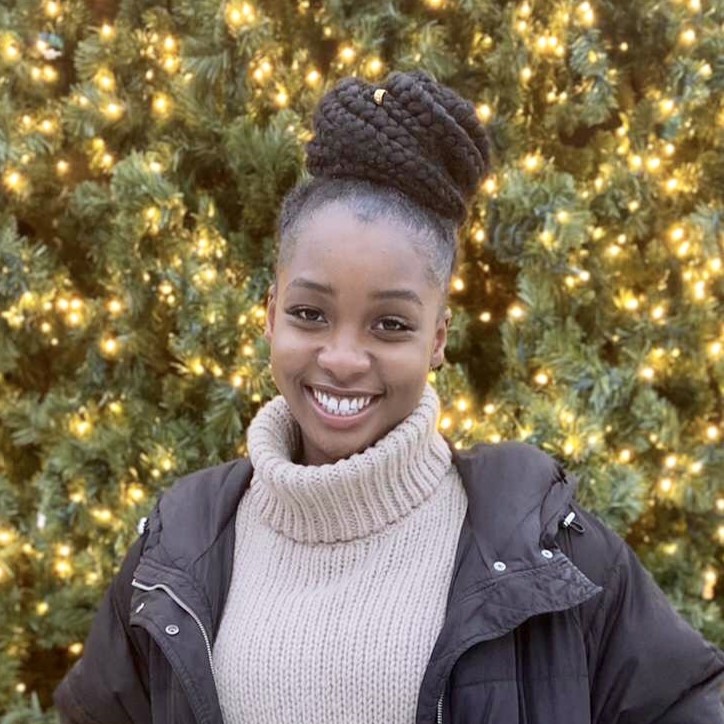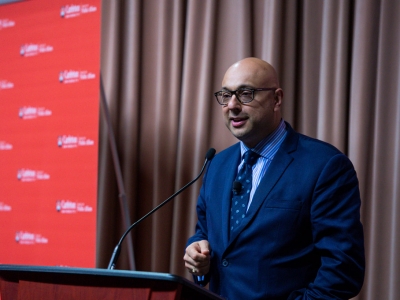By Jena Lynde-Smith
Asha Berbeck, a fourth-year student in Carleton’s psychology program, is a natural-born leader and advocate. During high school she was part of many extracurriculars — she was class president and treasurer, vice-president of the students’ association, captain of the basketball team, a member of the choir and an active volunteer.
When she joined Carleton, Berbeck knew she wanted to continue being involved in school life. She started attending events held by Black Student Alliance, Carleton’s Black student association. In her second year she applied to be a Residence Fellow (RF) — an upper year student who supervises a floor of students in residence.
She spent two years as an RF during the height of the COVID-19 lockdowns and says campus life was lonely as classes moved online and restrictions were put into place preventing students from socializing.
“It was a very sad time,” Berbeck says. “But it really made me step in and do everything I could to help the students feel connected.”

Asha Berbeck
During her time as an RF, Berbeck noticed issues surrounding BIPOC representation in residence. She found there were very few BIPOC RFs and residence managers, which made it hard for herself and fellow students to feel comfortable in sharing their experiences. She also realized that there weren’t many events and initiatives catered to BIPOC communities.
“Residence is a home away from home, so it’s imperative that we all feel recognized,” she says.
Not someone to stand by and watch, Berbeck and some fellow RFs organized an event called Black at CU in response.
“We felt like we weren’t seen as much as we would like to be,” says Berbeck. “We wanted to host this event to share our experiences of being Black students living in residence. We talked about how we feel and where we wanted to see improvement and the staff were super receptive.”
Following the event, Berbeck and the other organizers took their advocacy a step further. They launched a group called BIPOC Residence Life Connections. The group’s goal was to provide a safe space for residence staff to connect, and to allow them to anonymously share thoughts and concerns with managers.
In her third year, Berbeck began working as a community developer for Housing and Residence Life Services, which allowed her to expand her scope of involvement even more.
“I loved that position, because instead of just focusing on my floor, I was able to focus on all residence students and residence life staff,” Berbeck says. “It felt really good to be part of that and to be able to advocate for change at that level.”
Itching to do more, Berbeck joined the university’s New Names for New Times Committee in August 2021 as the only student representative. The initiative was launched to rename three campus buildings and to reflect Carleton’s diversity and commitment to inclusion. The committee is made up of faculty and staff leaders at Carleton who are tasked with coordinating the renaming of the buildings through discussions and deliberations with various communities.
“My job was to act as a voice for the student body,” she said. “I also had the opportunity to be a part of the conversations with BIPOC communities, which was an amazing learning experience.”
Berbeck was intimidated to be a part of such an important project at first, but she said the encouragement from the committee helped her feel like she belonged.
“They made me feel seen and heard, and always made sure to reinforce the fact that I deserved to be there and that my opinion mattered,” Berbeck says.
As Black woman, Berbeck believes that this kind of encouragement is vital and hopes that she can pass it along to others.
“Being a Black woman, we are often scared to step into spaces and to speak up. But our voices matter. If we see a problem, it is never going to be fixed unless we use our voice,” she says. “That’s with anything in life — school, relationships, work — your voice matters and it needs to be heard.”
For Berbeck, this is part of why Black History Month is so important — to elevate the voices of Black people and to celebrate their triumphs.
“Black people are creating history,” says Berbeck. “We’re recreating achievements, redoing things. Just look at the Golden Globes — to this day you hear ‘first Black woman or first Black producer.’
“Black History Month is an opportunity to put emphasis on these accomplishments, while reflecting on the past, and hoping to continue improving and achieving greatness in the future.”
During Black History Month, the Carleton community is mobilizing to promote and highlight Black leadership, achievements and experiences. While Black History Month is an important moment to mark annually, Carleton recognizes that Black inclusion must be an everyday, year-round priority. Visit newsroom.carleton.ca/black-history-month to learn more.
Monday, January 30, 2023 in Black History Month, Psychology
Share: Twitter, Facebook



